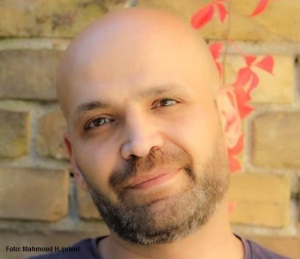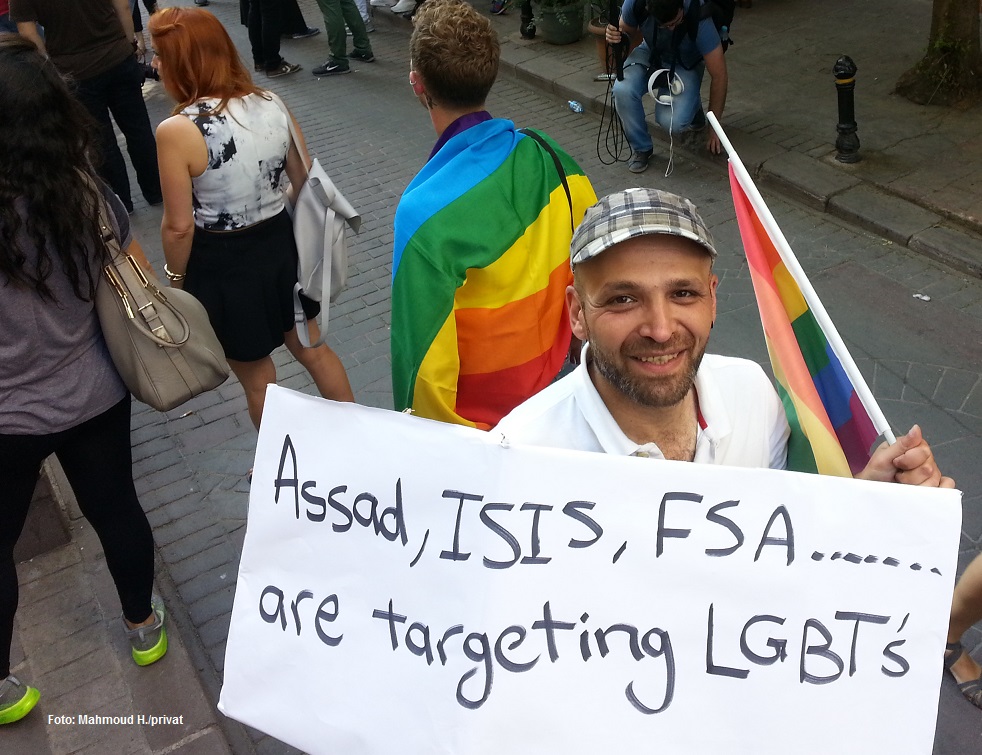Mahmoud flees the Syrian civil war and eventually ends up in Germany. As a well-known gay activist, he is quickly granted asylum. Here he explains why he felt more helpless in the Berlin refugee centre than in Assad's secret prison.
Dictators can't take a joke. Mahmoud learnt this in February 1999, when Syria's President Hafiz al-Assad called for an election. The only candidate was himself. Mahmoud, then 24, was prepared to play along - if only to avoid any problems when it came to changing his degree programme: English literature instead of medicine. "I wanted it to be easier," admits Mahmoud. But a simple "yes" is not enough for the dictator. Mahmoud was supposed to swear allegiance to his president with a drop of blood, a thumbprint on the ballot paper. "I didn't want to swear a blood oath to a criminal and claimed that I was a viral phobic," reports Mahmoud. "At the time, I thought I was talking to intelligent people." But the election officials did not tolerate any tongue-in-cheek excuses. They had Mahmoud arrested and sent to a cell somewhere in Syria: no trial, no message to his relatives. The student is beaten up every day. "After two months, I came to myself on the street," reports Mahmoud, "I had to ask a taxi driver where I was." By then, Hafiz al-Assad had already been confirmed in office with 99.9 per cent of the vote.
Mahmoud gave up his studies and looked for a job in Jordan. He did not return to Syria until 2003. To a "Damascus Spring" under the new President Bashar al-Assad, Mahmoud did not believe. But he wanted to come to terms, even with the Mukhabarat, the notorious secret services. "They want to control every aspect of life," says Mahmoud, shrugging his shoulders, "but that was okay, the normal harassment." After studying literature, he worked as a cultural journalist in Damascus. When the civil war broke out in 2011, Mahmoud started blogging: "Syriangayguy" doesn't mince his words. Distant relatives discover the blog during a visit and threaten to press charges against Mahmoud. Mahmoud does not want to go to the secret prison a second time. On 31 October 2011, he travels to Istanbul. He has friends there and can work as an English teacher. "I didn't feel like a refugee there yet," Mahmoud emphasises. He doesn't give up that easily: in 2012 he founds Mawaleh"Syria's first queer magazine". "It was clear to me that homosexuals have a special interest in overcoming the Assad regime," emphasises Mahmoud.
It is only gradually that Mahmoud begins to feel like he is on the run. His passport expires in 2016. "As a stateless person, I can't travel," explains Mahmoud, "but as a journalist, I have to be mobile." Friends in the EU have often urged him to apply for asylum in an EU country. The death of his mother made Mahmoud's decision easier: "Until then, I had hoped to be able to see her again more easily in Turkey." In summer 2014, the Heinrich Böll Foundation invites Mahmoud to Berlin. As a well-known gay activist, he is to speak at a conference about the situation in the Middle East. "This is your last chance," say his friends. Mahmoud hesitates. "Germany is the only rich country that has never participated in a UN resettlement programme for refugees from Iraq," explains Mahmoud. "That put me off." It is only on the plane that the decision is made: "Hell, Germany it is!"

On 19 June 2014, Mahmoud went to the Berlin State Office for Health and Social Affairs with a friend and asked for asylum, bringing with him many letters of recommendation, including from Reporters Without Borders. "I came well prepared," says Mahmoud. "But the process still felt terrible. When I was in prison in 1999, I had more control over things than I did then," says Mahmoud. "They did beat me up, but they didn't get anything out of me."
As an asylum seeker in Germany, Mahmoud feels powerless. He has to live in a care home, even though he could move in with friends. Each benefit is granted individually: A train ticket, food, a doctor's appointment. "You have a problem, but nobody is interested in you," criticises Mahmoud. Mahmoud had to queue three days in a row, from 6 a.m. to 2 p.m., to renew his monthly travel pass. "And at two o'clock, an official comes out of the room and says: 'No more Berlin passes today'," reports Mahmoud. "I can queue for hours - but what about a mother with small children?"
Mahmoud has fared better than most refugees. As an internationally active journalist and gay rights activist, the authorities could easily understand his reasons for fleeing. After seven weeks, his asylum procedure was finalised. Mahmoud's residence permit is valid for three years. "I'm privileged," Mahmoud emphasises, "but I still doubted myself during the asylum procedure. If such a short procedure is already so upsetting for me, how must it be for people who have to wait years for a decision?" Asylum procedures currently take an average of five months. Applicants from Afghanistan wait over a year for a decision.
To help them, Mahmoud has been accompanying other refugees through the asylum process since August, as part of the Queer Refugees" project. The gay counselling service Berlin launched it in the summer. Mahmoud explains documents, helps people fill out applications and encourages them. "It helps if someone explains step by step what you can do," says Mahmoud. "Otherwise the process overwhelms you." Mahmoud has already worked with gay and lesbian refugees in Damascus. They had fled from the militias in Iraq, who were deliberately murdering gay men. The conversations he had there shaped his image of refugees. "In my mind, refugee stands for a strong will," says Mahmoud. "These people wanted to live!"










